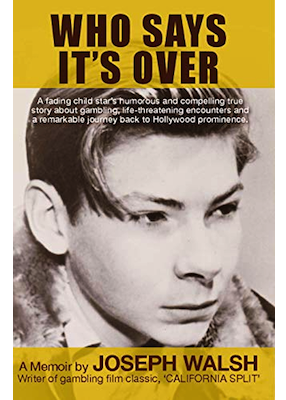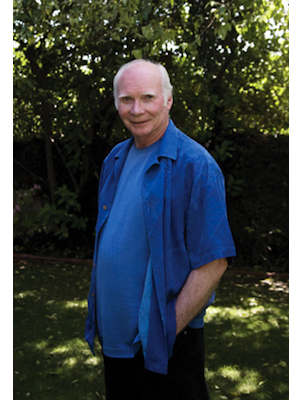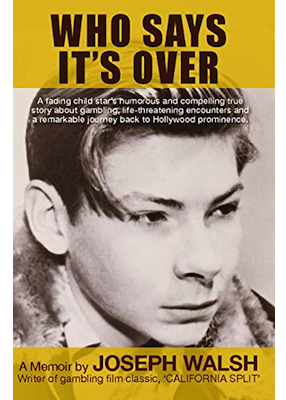Do you know Joseph Walsh? You should.
Walsh wrote, co-produced, and appeared in what many consider one of the greatest gambling movies ever made, 1974’s California Split directed by Robert Altman. In a ranking of the best movies about gambling compiled earlier this year by New York magazine’s Vulture website, Split earned the top spot ahead of other favorites like The Hustler, Rounders, and the recent Uncut Gems.
Walsh’s career in movies and television stretches all of the way back to the late 1940s when he was a child actor appearing in films alongside Danny Kaye and Kirk Douglas. Over the years since, he’s acted and/or interacted with a virtual who’s who of Hollywood.
As a dedicated gambler and sports bettor, Walsh also knows more than a little about the highs and lows of point spreads and parlays. Wondering about who to bet from next Sunday’s NFL slate? You could do a lot worse than to check with Joey.
If you don’t know Walsh, I have some good news. At age 83, he’s penned a fantastic memoir, Who Says It’s Over.
The book is a legitimate page-turner, packed with entertaining and edifying stories about his acting, his gambling, and other life adventures. It’s not only laugh-out-loud funny but full of insight about life’s many risks and rewards too.
I had the chance to talk with Walsh about both his new book and the continued appeal of California Split. Stay tuned in the coming weeks for our conversation about the film.
Meanwhile, read on for an introduction to Walsh’s new memoir, starting with the author’s explanation for how he came to write it.
From Billy the Kid to Billy the clerk to Joey the memoirist
More than four decades after California Split was made, Walsh remains in touch with both of its leads, Elliott Gould and George Segal. In fact, Gould is a lifelong friend with whom Walsh still talks several times a week.
However, it was Segal, as Walsh explains, who helped push him down the path toward writing Who Says It’s Over.

Back in the 1960s, Walsh had earned a role in a western in which Segal also appeared, Invitation to a Gunfighter starring Yul Brynner. During the making of the film, the pair never interacted, as they hadn’t any scenes together.
For Walsh, his memory of the film primarily centers around a humorous, self-deprecating anecdote regarding his initial misunderstanding of his part.
Thinking he’d been hired to play a major role as Billy the Kid, in fact, Walsh’s part was much smaller. After building himself up with excited anticipation, Walsh was devastated to learn he was in fact playing Billy the clerk, a bit role with only two lines.
Once they got to know each other later, Walsh shared that story with Segal, who in turn, retold it many times to others over the years. Recently Segal reminded Walsh how far the story had traveled.
“I’ve gotten so much mileage out of it,” Segal told Walsh. “You should write it down. It’s hysterical.”
With some skepticism, Walsh did write it down, not knowing if anyone besides Segal would ever read it. Upon receipt Segal pushed him further, urging him to build upon references to other life episodes hinted at in the original tale.
“So that’s how three or four pages became 32 pages,” explains Walsh. “And I must say… beautifully written pages,” he adds with a laugh.
It was too long for a New Yorker piece, despite editor David Remnick‘s admiration for it. But time passed, others provided further encouragement, and the writing continued.
“My wife has always felt… you know, that there’s a movie in it,” explains Walsh. In the book’s introduction, he provides a thumbnail sketch of such a film’s plot, delivered in the form of a pitch:
“New York street kid becomes reluctant child star… interacts with famous people… faces career slide… turns into gambling guru… attracts the Hollywood wagering elite… faces death… writes classic movie… and for extras, experiences reincarnation.”
After more than a year of writing in earnest, the potential movie had become an actual memoir. Perhaps one day the memoir might itself be reincarnated as a movie. Whether that happens or not, Walsh will be content, given his other, most important reason for writing Who Says It’s Over.
“The biggest motivation for writing it was my kids,” he says. “I said to myself, ‘Joey, what do you have to lose? You can leave your whole story for your four kids.’” Thinking back to his own parents and how he’d missed the chance to learn their stories in a similar way, that was all the incentive he needed.
Recognizing a gamble worth taking, Walsh was all in.
Famous child actor, inveterate gambler, Hollywood home game player
That sketch above provides an idea of the book’s general outline. In the book, Walsh carries us from scene to scene in a quick-moving series of short chapters, many of which highlight a particular, notable life event.
The first act is marked by stickball games, aspirations to be a boxer, and Walsh almost accidentally becoming the most famous child actor in New York City.
Young adulthood then finds Walsh turning to gambling, sports betting in particular. That’s when his friendship with Gould first formed, highlighted early on by Walsh going an incredible 14-0-1 on his football picks betting he and Gould’s money. (More on that story in our discussion of California Split.) While Walsh’s new sports betting career occasionally brings him good fortune, at other times it puts him at serious risk, both financially and even physically.
Then comes the move to Hollywood, also happening somewhat by chance, followed by additional adventures in gambling, acting, and other contexts.
Walsh’s IMDB page is long and varied. It only represents a fraction of his credits as he appeared on over 300 television shows as well as in dozens of films where he mostly played supporting roles.
Meanwhile, in his book, A-listers constantly pop up as Walsh’s supporting cast, including:
- James Dean
- Frank Sinatra
- James Garner
- Gregory Peck
- John Wayne
- Robert Mitchum
- Jack Lemmon
- Steven Spielberg
- Peter Falk
- Elvis Presley
- Groucho Marx
- Jack Nicholson
Dozens of other familiar names from the small and big screens appear as well. The stories not only help chronicle various episodes and eras of Walsh’s life. Each also provides a hearty laugh, a life lesson, or oftentimes both.
“I actually left many people out,” Walsh explains. “I didn’t include anything in the book just to name drop. There had to be something to it… there had to be a story involved.”
For example, Walsh tells of playing in a regular poker game hosted by Hollywood legend John Huston. Walsh describes himself bluffing the director of The Maltese Falcon out of a pot in five-card stud. Later, during a break, Huston takes him aside to ask him a question.
In the hand when Walsh raised and Huston folded, did Walsh have more than the pair of fours he was showing? Walsh admits he did not, and Huston’s reaction is both amusing and affecting.
“‘Well done!!’ he declared jubilantly,” writes Walsh. “There wasn’t even a tinge of ego involved. It was the purest moment I ever witnessed.”
“In terms of life, he had upped the ante,” he writes.
The short tale reveals something meaningful about Huston, testifying to his character. It also says something about Walsh in the way he recognizes he earned something much more valuable than what was in the pot when Huston let his better hand go.
‘A kaleidoscope and gold mine about a one of a kind human being’
Walsh additionally shares how California Split ultimately went from idea to reality, its triumph completing a remarkable comeback for the child actor whose star had faded. Who Says It’s Over offers numerous other takeaways as well, perhaps especially for those who enjoy a gamble every now and then.

It’s a story replete with unexpected turns. More than once what seems in the moment like a devastating loss turns out to be a substantial win.
In a way, exploring the significance of those surprising life detours is one of the book’s primary purposes. As Walsh writes early on, “in between what you want and what you get is why we tell each other stories.”
Walsh reiterates that theme when talking about his book. From Walsh’s perspective, the fact that life doesn’t always give you winners is no reason to discourage you from continuing the game.
“When you cry over something that doesn’t work out, you crowd out the next moment,” says Walsh. “Open the door to the next moment. Take everything for what it is. Don’t put it into a ‘good’ or ‘bad’ category. Stay humble. If you need to complain, get it out of your system right away and let it go. The universe is looking to work for you. Help the universe along.”
It’s an outlook gamblers should appreciate. It also one constantly present throughout Walsh’s book, helping to provide clarity to a story his friend Gould describes as “a kaleidoscope and gold mine about a one of a kind human being.”
Anyone with an interest in gambling, Hollywood, or great storytelling combining laughter and learning should take a chance on Who Says It’s Over.
Who Says It’s Over by Joseph Walsh is available now in paperback and as an e-book via Amazon.
The post A Gamble Worth Taking: ‘California Split’ Writer Joseph Walsh Pens New Memoir appeared first on Play CA.
